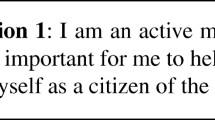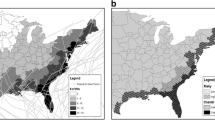Abstract
Learning about the causes and consequences of climate change can be an important avenue for supporting mitigation policy and efficient adaptation. This paper uses internet search activity data, a distinctly revealed preference approach, to examine if local weather fluctuations cause people to seek information about climate change. The results suggest that weather fluctuations do have an effect on climate change related search behavior, however not always in ways that are consistent with the projected impacts of climate change. While search activity increases with extreme heat in summer and extended periods of no rainfall and declines in extreme cold in winter, search activity also increases with colder winter and spring average temperatures. Some of the surprising results are magnified when heterogeneity by political ideology and educational attainment in responsiveness is modeled, which could suggest that different people have different perceptions about what types of weather define climate change or that climate science deniers seek information through Google. However, the results also indicate that for all groups in the political and educational spectrum, there exist weather events consistent with the predicted impacts of climate change that elicit increased information seeking.

Similar content being viewed by others
Notes
Google Trends data are being increasingly utilized as a measure of contemporary awareness across of wide variety of indicators (e.g., Ginsberg et al. 2009 for influenza, Choi and Varian 2012 for predicting unemployment). Similar to this paper, Kahn and Kotchen (2011) use Google data to examine interest in global warming. They use state level data to show that interest in global warming declines when unemployment increases.
Revealed preference refers to research that seeks to understand preferences by observing real choices, whereas stated preference relies on answers to questions about preferences.
Shanahan and Good (2000) find some evidence that media attention to climate change increases during unusually warm spells.
The exact query was “climate change” + “global warming”, which counts any search including either of the phrases “climate change” or “global warming”.
This is similar to the semi-parametric binning approach found in Deschênes et al. (2009), who study to impact of weather on birth weight.
Query share is larger for global warming than climate change. As a result, the regression results for global warming are quite similar to the results for global warming + climate change. Results for climate change by itself are consistent as well, but there is much less statistical significance, likely due to lower search volumes and more resulting zeros. Cavanaugh et al. (2014) explore the determinants of search interest for global warming and climate change, separately, in a cross sectional setting. While determinants are similar, their results suggest that cities with more Democrats, more college educated people and more white people are more likely to search for global warming than climate change.
The results presented in the next section are robust to small changes in the 80 % mark. An alternative strategy for dealing with the zeros is to drop the first few years of data, which is when most of the zeros occur. This strategy has the advantage that it does not disproportionately drop observations from some media markets. The results are similar when using this strategy.
An alternative to defining extremes in absolute terms is defining them in relative terms. This would allow a 90 °F day in Phoenix to elicit a different response than a 90 °F day in Seattle. The online appendix reports results when defining extremes based on deviations from historical, media market-specific climate. Results are similar to those using an absolute definition of extremes, likely due to the presence of media market fixed effects, which capture the fact that Phoenix has many more 90 °F days than Seattle.
These results are not due to counteracting effects of average and extreme variables. The coefficients on the average variables are similar when excluding the extreme and streak variables from the model, and the reverse is also true. See Appendix Table A4.
For any search term, Google Trends provides a list of common related search terms. The most common skeptic-specific search term was global warming hoax, but this term is more than 26 times less common than global warming. In addition, search volume is too low for the time series data of global warming hoax to be released for the vast majority of media markets. Even when a time series is available, there is typically only a single spike in search activity surrounded by zeros. However, a search for global warming can lead to skeptic websites. In addition to Wikipedia, EPA, and Scientific American entries on global warming, there are news stories from both sides of the debate and one popular denier website (globalwarming.org). A search for climate change tends not to lead to skeptic sites.
Given the uneven geographical distribution of political ideology and educational attainment in the United States, the results in Table 4 could be attributable to people of different climates responding differently to weather fluctuations. To examine this possibility, I also estimated a variation of Eq. (1) in which the weather variables were interacted with indicator variables for climate terciles (defined by annual average temperature over the past 15 years). Results suggest few differences between climate zones.
References
Akerlof K, Maibach EW, Fitzgerald D, Cedeno AY, Neuman A (2013) Do people ‘personally experience’ global warming, and if so how, and does it matter? Glob Environ Chang 23:81–91
Cavanaugh P, Lang C, Li X, Miao H, Ryder J (2014) Searching for the determinants of climate change interest. University of Rhode Island Working Paper
Choi H, Varian H (2012) Predicting the present with Google Trends. Econ Rec 88:2–9
Deschênes O, Greenstone M, Guryan J (2009) Climate change and birth weight. Am Econ Rev 99(2):211–217
Egan PJ, Mullin M (2012) Turning personal experience into political attitudes: the effect of local weather on Americans’ perceptions about global warming. J Politics 73(3):796–809
Gentzkow M, Shapiro JM (2008) Introduction of Television to the United States Media Market, 1946–1960. ICPSR22720-v1. Chicago, IL: University of Chicago/Ann Arbor, MI: Inter-university Consortium for Political and Social Research [distributors], 2008-09-30. doi:10.3886/ICPSR22720.v1
Ginsberg J, Mohebbi MH, Patel RS, Brammer L, Smolinski MS, Brilliant L (2009) Detecting influenza epidemics using search engine query data. Nature 457:1012–1014
Goebbert K, Jenkins-Smith HC, Klockow K, Nowlin MC, Silva CL (2012) Weather, climate, and worldviews: the sources and consequences of public perceptions of climate change in local weather patterns. Weather Climate Soc 4(2):132–144
Hamilton L, Lemcke-Stampone M (2013) Arctic Warming and Your Weather: Public Belief in the Connection. Int J Climatol n/a
Hamilton L, Stampone M (2013) Blowin’ in the wind: short-term weather and belief in anthropogenic climate change. Weather Climate Soc 5(2):112–119
Howe P, Leiserowitz A (2013) Who remembers a hot summer or a cold winter? The Asymmetric effect of beliefs about global warming on perceptions of local climate conditions in the U.S. Glob Environ Chang 23(6):1488–1500
IPCC (2013) Summary for Policymakers. In: Climate Change 2013: The Physical Science Basis. Contribution of Working Group I to the Fifth Assessment Report of the Intergovernmental Panel on Climate Change [Stocker, T.F., D. Qin, G.-K. Plattner, M. Tignor, S. K. Allen, J. Boschung, A. Nauels, Y. Xia, V. Bex and P.M. Midgley (eds.)]. Cambridge University Press, Cambridge, United Kingdom and New York, NY, USA
Jacobsen GD (2011) The Al Gore effect: an inconvenient truth and voluntary carbon offsets. J Environ Econ Manag 61:67–78
Kahn ME, Kotchen MJ (2011) Business cycle effects on concern about climate change: the chilling effect of recession. Climate Change Econ 2(3):257–273
Maibach E, Roser-Renouf C, Leiserowitz A (2009) Global Warming’s Six Americas 2009: An Audience Segmentation Analysis
Shanahan J, Good J (2000) Heat and hot air: Influence of local temperature on journalists’ coverage of global warming. Public Underst Sci 9(3):285–295
Stephens-Davidowitz S (2013) The effects of racial animus on a black presidential candidate: using Google search data to find what surveys miss. Harvard University Working Paper
Zaval L, Keenan E, Johnson E, Weber E (2014) How warm days increase belief in global warming. Nat Clim Chang 4(2):143–147
Acknowledgments
I thank Laura Bakkensen, Carrie Gill, Sarah Jacobson, Jesse Tack, seminar participants at Clark University and the 2013 NAREA conference, and three anonymous referees for valuable comments. George Sfinarolakis and David Ryder are thanked for research assistance. This paper is a contribution of the Rhode Island Agricultural Experiment Station (#5362).
Author information
Authors and Affiliations
Corresponding author
Electronic supplementary material
Below is the link to the electronic supplementary material.
ESM 1
(PDF 99 kb)
Rights and permissions
About this article
Cite this article
Lang, C. Do weather fluctuations cause people to seek information about climate change?. Climatic Change 125, 291–303 (2014). https://doi.org/10.1007/s10584-014-1180-6
Received:
Accepted:
Published:
Issue Date:
DOI: https://doi.org/10.1007/s10584-014-1180-6




